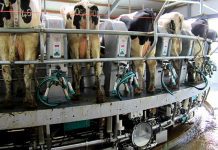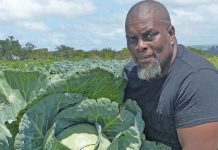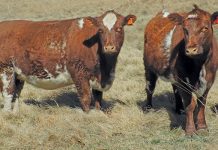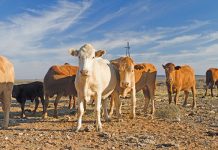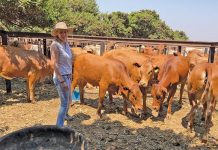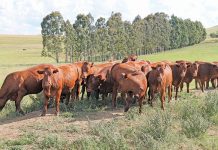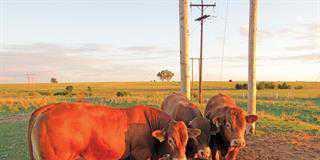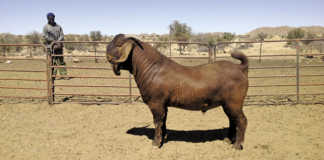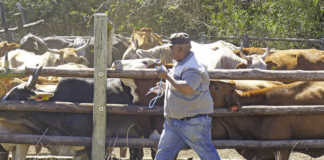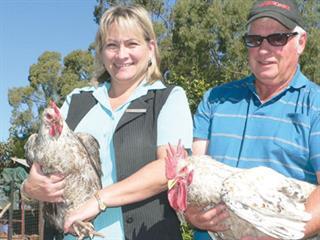
A long-standing interest in poultry breed varieties – their differences in colour, build, and production characteristics – prompted commercial dairy farmers Jaap and Shirley Schoeman of Oliefontein farm in Kokstad, KZN, to experiment with crossbreeding to produce poultry products initially for their own use.
In 2001 Jaap bought four white Cornish hens, four Barred Plymouth Rock hens, and a cockerel of each breed at the annual Royal Show in Pietermaritzburg. The Cornish is known for its meaty build, while the Barred Plymouth Rock lays well. Jaap thought that crossing the two would be the first logical step in developing a dual-purpose egg- and meat-producing chicken.
“For about 18 months I crossbred these chickens and their offspring,” Jaap recalls. “We noticed that the progeny laid at a respectable rate of about 70% of what I’d heard typical commercial layers do. The chickens also produced decent meat, and were hardy enough for our free-range system with -3°C to -5°C winters and up to 40°C summers.”
Managing the chickens
During this period, the Schoemans kept their flock size below 50 birds for easy management. They fed their chicks a Meadow Feeds broiler starter ration ad lib for the first 14 days after hatching. From this age until point-of-lay at about 20 weeks, the chickens would each get 170g of a home-mixed ration of ground yellow maize, ground soya, sunflower cake, bran and essential trace elements before midday.
Once the hens had started laying, all the chickens would get the same ration and Jaap would add lime to the hens’ ration to ensure strong eggshells. After midday, chickens over 14 days got whole yellow maize grain, with garden and kitchen greens. Limiting the crossbred flock to 50 birds allowed Jaap and Shirley to select the better specimens as improved breeding stock, generating income by selling the surplus.
Fine-tuning the Bakgat
But the Schoemans felt their homebred chicken needed some fine-tuning, especially in meat production and colour. Emerging poultry farmers wanted darker and more colourful birds. So the couple bought cockerels of the hardy Venda and the dual-purpose Black Australorp and Wyandotte breeds, all of which show considerable colour variation.
“We divided our cross-bred hen flock into three smaller flocks, and put one cockerel of the three above-mentioned breeds in each,” says Jaap. “We got a wide variety of colours and patterns in the offspring.” Jaap named them Bakgat (Afrikaans slang for “fantastic”) chickens, and they’re becoming increasingly popular with rural emerging farmers.
The Schoemans select the heaviest 20% of the offspring with the desired colours and patterns from each of the three flocks at 15 weeks old. “For the past five years our flock has been genetically closed, but we strictly select for weight at the end of a 15-week growing period,” says Jaap. “Hens slaughter out at a minimum of 3kg and the cockerels at up to 4kg.”
The slower-growing Bakgat broiler is less susceptible to soft bones, respiratory and circulation problems, worms and diseases than its rapidly-growing commercial broiler counterpart. Bakgats are vaccinated only for Newcastle disease at a day old, and are medicated with the anthelminthic Tramazole every 21 days. The birds subsist happily on a low-maintenance diet. The Bakgat’s meat is light-beige in colour, compared to commercial broilers’ white meat. Meat tenderness is comparable to or even better than that of a commercial broiler. Even at 15 weeks, a Bakgat can be slaughtered and put straight onto a braai without prior tenderising, says Shirley.
Future Bakgat improvements
The Schoemans are satisfied with slaughter weight, meat quality and colour, but now plan to improve the Bakgat’s egg production by weeding out genetics incapable of laying an egg every 1,5 days on average from maturity.
They also want to isolate some of their chickens and breed them towards a pitch-black colour, as required by some customers for traditional ceremonies. “We now have about 1 000 chickens in a one cockerel to eight hens ratio,” explains Jaap. “We want 2 000 laying hens. We produce about 1 000 eggs at a time for incubating and hatching on the farm and by a third party.
“We select our breeding stock from our own chickens and sell the rest at around R28/kg, more than adequately covering our inputs – a good price for free-range, organically-produced chickens,” ends Jaap.
How Jaap and Shirley market their Bakgat chickens
“The popularity of our Bakgat chickens caught Shirley and I by surprise,” says Jaap. “People from the nearby rural old-Transkei area came here to buy cabbages from us, saw our chickens and convinced us to sell them some. They told their friends about our chickens and they then came to buy some too. Word of mouth has been behind the growing demand for our chickens. We sell around 500 to 600 chickens per month.” And at R28/kg, that’s a welcome additional income for the Schoemans.
Shirley also placed an online advert and was surprised by the great response. Farmers from all over South Africa, as far away as Vryburg in the North West, were buying 50 or so Bakgats to raise in their backyards for eggs and meat. Many of Jaap and Shirley’s clients from rural areas are aspiring poultry farmers who buy 100 to 150 Bakgats to breed their own Bakgat offspring to sell in their local communities.
The Schoemans say that two of the more interesting orders that they’ve had include one for a black Bakgat for use in a traditional ceremony – the buyer travelled 240km from Umtata in the Eastern Cape to buy this chicken. The other order was from a South African working for a sheik in Saudi Arabia. After seeing Shirley’s online advert, he told his employer about Bakgat chickens. The sheik was then very keen to order some and have them shipped to Saudi Arabia to see how they’d perform in the country’s harsh climate.
“There’s a lot of red tape, but as soon as this is dealt with, we’ll be sending chicks over,” says Jaap.
Contact Jaap Schoeman at 083 256 6100.

